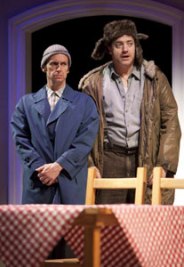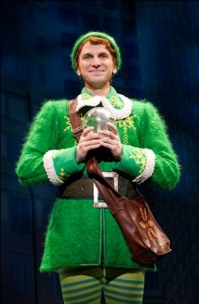Category: "Broadway"
Review: Donny & Marie: A Broadway Christmas
Dec 16th
 A little bit of Las Vegas has arrived in New York for the holiday season. It takes the form of Donny & Marie: A Broadway Christmas, featuring the sibling performers who have nearly a century’s worth of show business experience between them. While watching this wonderfully cheesy and entertaining confection you can practically hear the whirring and squawking of slot machines nearby.
A little bit of Las Vegas has arrived in New York for the holiday season. It takes the form of Donny & Marie: A Broadway Christmas, featuring the sibling performers who have nearly a century’s worth of show business experience between them. While watching this wonderfully cheesy and entertaining confection you can practically hear the whirring and squawking of slot machines nearby.
Although being sold as a holiday entertainment, the show is basically their standard act, with the addition of a handful of Christmas tunes.
It’s easy to see why Donny and Marie, unlike so many child stars of their generation, have continued to prosper in show business. They work hard, extremely hard, to give their audiences what they want. This elaborate production--which begins with the two performers emerging dramatically on risers while seemingly thousands of LED lights pop and the onstage rock band plays furiously--showcases their considerable talents to full advantage.
The brother and sister each take solo turns. Marie proudly demonstrates her vocal eclecticism by foraging into country (her hit “Paper Roses”); rock (“Would I Lie to You”), pop (“Boogie Woogie Bugle Boy”); show tunes (a Broadway medley that’s as exhausting to watch as it must be to perform) and even “opera” (“Pie Jesu” from Andrew Lloyd Webber’s Requiem).
She also brings up a male volunteer from the audience for a steamy duet on “Blue Christmas” that in this case was enlivened by the recruit’s comic eagerness for both the close clinches and an impromptu vocal.
Then it’s Donny’s turn, with his now middle-aged female fans squealing with adolescent excitement. After an all-too-serious rendition of his 1989 pop hit “Soldier of Love,” he delivers a self-deprecating medley of his teen smashes like “Go Away Little Girl” and “Puppy Love.” (Observing his youthful self on a giant video screen, he jokes, “That’s Justin Bieber up there.”) He also performs “Any Dream Will Do” (from the show he toured in for years, Joseph and the Amazing Technicolor Dreamcoat) and the Osmonds’ atypically hard-rocking “Crazy Horses.”
The pair reunites for the final segment, featuring elaborate production numbers showcasing the dance moves they exhibited on their respective turns on Dancing With the Stars. A running gag has Donny proudly commenting on the fact that he won while his sister only managed to come in third.
For all the strenuous effort involved for most of the evening, the most charming moment comes towards the end, when the performers simply sit on stools and sing to a video montage of moments from their careers, including their variety and talk shows. Their kidding comic banter, scripted as it may be, has the relaxed feeling of genuine sibling affection.
Marquis Theater, 1535 Broadway. 877-250-2929. www.ticketmaster.com. Through Jan. 2.
Review: Elling
Nov 22nd
 It was an Oscar nominated foreign-language film and a hit on the West End in London, but Elling proves well nigh insufferable in its Broadway incarnation. Playwright Simon Bent’s adaptation of the Norwegian novels by Ingvar Ambjornsen and the subsequent acclaimed movie proves itself to be a throwback to such dated 1960’s era films as “King of Hearts” in its depiction of mental illness as a compendium of comic quirks.
It was an Oscar nominated foreign-language film and a hit on the West End in London, but Elling proves well nigh insufferable in its Broadway incarnation. Playwright Simon Bent’s adaptation of the Norwegian novels by Ingvar Ambjornsen and the subsequent acclaimed movie proves itself to be a throwback to such dated 1960’s era films as “King of Hearts” in its depiction of mental illness as a compendium of comic quirks.
Denis O’Hare and Brendan Fraser play the central roles of Elling and Kjell Bjarne, two residents of a mental asylum who are released and set up in a pristine Oslo apartment to make their own way in the world. Under the supervision of social worker Frank (Jeremy Shamos), they learn to experience life and love while developing a strong bond in the process.
Obsessive/compulsive Elling is the far more intellectual of the duo; he describes his institutionalization as having accepted an offer from the government to supply a place for “people who are in a hectic phase in their lives.” The overgrown man/child Kjell is a forty-year-old virgin who obsesses about food and sex and who has a recurring problem with his uncontrollable erections.
The play depicts their burgeoning relationships with each other and with such figures who enter their lives as Reidun (Jennifer Coolidge), a pregnant upstairs neighbor with whom Kjell falls hopelessly in love, and Alfons (Richard Easton), an elderly poet who helps Elling channel his artistic impulses.
The play’s humor derives from the main characters’ respective peculiarities. Giving his roommate a gift of a miniature house made out of matchsticks, Kjell proclaims, “If you don’t like it I’ll kill myself.” He nearly passes out from pleasure while eating his first slice of home-delivery pizza, and becomes obsessed with phone sex lines. Elling transforms himself into the “Sauerkraut Poet,” inserting his verse into packets of sauerkraut at random supermarkets.
Under the uninspired direction of Doug Hughes, it’s all too cutesy by far, and despite the especially game performances by O’Hare and Fraser (the latter looking far different from his buff days as “George of the Jungle”) the evening meanders to the point of inconsequentiality.
Coolidge is, as usual, hysterically funny in her multiple roles, especially in her brief turn as a pretentious poet who delivers a sample of her works that were written “while sick with malaria in Cambodia.” Easton offers study support as Elling’s mentor and Shamos is winning as the beleaguered social worker. But their efforts are ultimately defeated by the evening’s witless triviality.
Ethel Barrymore Theatre, 243 W. 47th St. 212-239-6200. www.Telecharge.com.
Review: A Free Man of Color
Nov 19th
 There’s so much energy, intellectual ambition and gorgeous stagecraft on display in A Free Man of Color that it’s disheartening to report that it barely works at all. John Guare’s comic, historical epic dealing largely with the Louisiana Purchase is so willfully abstruse, so eager to show off, that audience reaction seems to have been merely an afterthought.
There’s so much energy, intellectual ambition and gorgeous stagecraft on display in A Free Man of Color that it’s disheartening to report that it barely works at all. John Guare’s comic, historical epic dealing largely with the Louisiana Purchase is so willfully abstruse, so eager to show off, that audience reaction seems to have been merely an afterthought.
Set between 1801-1806 in locations including New Orleans, France, Spain and others, the work is presented in the grand style of Restoration comedy, complete with the occasional rhyming couplets.
The titular character is Jacques Cornet (Jeffrey Wright, making a too long delayed return to the New York stage), a roué who glories in cutting his romantic swath among the eager women of New Orleans. The mulatto son of a wealthy white man and a black slave, he himself owns several slaves, including Murmur (Mos, apparently no longer Def, here reuniting with Wright for the first time since Topdog/Underdog).
But the foppish, florid Cornet is but one of some forty characters in this sprawling tale, which also features such real-life historical figures as Thomas Jefferson (John McMartin), explorer Meriwether Lewis (Paul Dano), James Monroe (Arnie Burton), Robert Livingston (Veanne Cox) and Napoleon (Triney Sandoval).
The piece varies wildly in tone, with the heavily stylized first act particularly alienating. The playwright frequently indulges in broad strokes of fantastical humor, such as his depiction of a grotesque phallus-wearing Napoleon who delivers a lengthy rant about everything British, including such modern icons as Julie Andrews and James Bond.
Although clearly attempting to examine such serious thematic issues as race relations and class differences in early 19th century America, Guare squanders the inherent potential of his fascinating subject matter and milieu with his kitchen sink approach to the material.
The labored work settles down somewhat in its second half, when it adopts a far more somber and direct tone. But by that time, the ceaseless and confusing procession of characters and subplots has drained most of our energy and attention.
Director George C. Wolfe, no stranger to sprawling epics (Angels in America), is unable to bring any real cohesion to the proceedings. He does, however, invest them with an undeniably striking theatricality, aided mightily by David Rockwell’s extravagant, versatile sets and Ann Hould-Ward’s gorgeous period costumes.
Wright is certainly arresting as Cornet, although his posturing eventually becomes slightly wearisome. Faring best are the performers who are allowed to stay relatively grounded in their characterizations, such as Mos’ resentful slave, McMartin’s conflicted Jefferson and Dano’s resolute Lewis.
Vivian Beaumont Theater, 150 W. 65th St. 212-239-6200. www.lct.org.
Review: The Merchant of Venice
Nov 15th
 Al Pacino famously spends years obsessing on the Shakespearean roles he takes on, but the results definitely pay off. Such is the case with his Shylock in the production of the Bard’s still controversial The Merchant of Venice that has transferred to Broadway—with some cast changes---after a brief run summer run in Central Park. While his performance in the 2004 film often came across as mannered, his stage rendition is undeniably mesmerizing. His starring turn anchors director Daniel Sullivan’s thoughtful revival which is attracting sell-out crowds.
Al Pacino famously spends years obsessing on the Shakespearean roles he takes on, but the results definitely pay off. Such is the case with his Shylock in the production of the Bard’s still controversial The Merchant of Venice that has transferred to Broadway—with some cast changes---after a brief run summer run in Central Park. While his performance in the 2004 film often came across as mannered, his stage rendition is undeniably mesmerizing. His starring turn anchors director Daniel Sullivan’s thoughtful revival which is attracting sell-out crowds.
Set in the Edwardian era, the production doesn’t sacrifice the comedic aspects of the play--the scenes involving Portia’s (Lily Rabe) ill-fated suitors are consistently hilarious--but its atmosphere is mainly harrowing. Antonio, the Christian nobleman, is powerfully portrayed by Byron Jennings as a condescending aristocrat whose barely disguised contempt fuels Shylock’s lust for revenge. Later, when he is about to be forced to give up his pound of flesh, he is chillingly strapped into an antique medical examination chair.
The director’s biggest innovation is the addition of a powerful silent scene in which we see Shylock submitting to a forced baptism. It not only vividly conveys the character’s humiliation, but also his inner strength as he afterwards immediately resumes wearing the yarmulke that has been stripped from his head.
Often speaking in a soft, sing-song voice, Pacino at first playfully emphasizes the character’s wily intelligence and humor, as well as his pained awareness of the marginal role in society to which he has been consigned. But after Shylock’s daughter Jessica (Heather Lind) runs off with her Christian boyfriend Lorenzo (Seth Numrich), he accentuates the bitterness that feeds the character’s steely resolve.
Lily Rabe brings both beauty and intelligence to her superb performance as Portia, and is uncommonly convincing in the pivotal scene in which her character assumes the identity of the male judge deciding Antonio’s fate.
The supporting roles are also finely handled, with especially solid turns by David Harbour as Bassanio, Marsha Stephanie Blake as the gentlewoman Nerissa and Jesse L. Martin as Gratiano. Christopher Fitzgerald expertly mines the expected laughs as Shylock’s servant, Launcelot Gobbo.
The production elements are first-rate, with Mark Wendland’s striking set design largely consisting of an abstract series of metallic circles that cannily echoes the wedding bands that figure so prominently in the plotline.
Broadhurst Theatre, 235 W. 44th St. 212-293-6200. www.telecharge.com. Through Jan. 9.
Review: Elf
Nov 15th
 It makes sense that, like the Disney and Dreamworks studios, Warner Bros. would want to mine its cinematic properties for Broadway musical treatment. Less understandable is why, for their attempt at a Christmas perennial with an adaptation of the hit Will Ferrell comedy Elf, they would turn to the same composers responsible for their previous venture, the ill-fated The Wedding Singer.
It makes sense that, like the Disney and Dreamworks studios, Warner Bros. would want to mine its cinematic properties for Broadway musical treatment. Less understandable is why, for their attempt at a Christmas perennial with an adaptation of the hit Will Ferrell comedy Elf, they would turn to the same composers responsible for their previous venture, the ill-fated The Wedding Singer.
Matthew Sklar and Chad Beguelin’s score for Elf--which has arrived on Broadway for a limited holiday engagement ala How the Grinch Stole Christmas and Irving Berlin’s White Christmas--is similarly unimpressive, and the show, despite boasting plenty of talent both on and off stage, is a theatrical lump of coal.
Hewing closely to the 2003 film, it tells the story of Buddy (Sebastian Arcelus), a suspiciously tall elf who works for Santa (George Wendt) at the North Pole. When Buddy finds out that he is actually human, he sets off for New York City in search of his identity.
There, he finds his real father, children’s book publishing exec Walter Hobbs (Mark Jacoby), who now has a second wife (Beth Leavel) and young son (Matthew Gumley). While attempting to ingratiate himself to his curmudgeonly dad, the childlike Buddy strikes up a burgeoning romance with cynical Macy’s employee Jovie (Amy Spanger) and attempts to restore Christmas spirit to everyone concerned.
“I’m an orphan, just like Annie,” announces Buddy at one point, but this show is no Annie, despite the fact that it shares the same writer, Thomas Meehan, here collaborating with Bob Martin (The Drowsy Chaperone). Their charmless book is filled with plenty of cheap gags addressed to the adults (“Don’t go all Charlie Sheen on me” is a typical example) and topical updates (Santa uses an iPad to keep track of things) when it’s not being hopelessly corny. Clearly aimed at the annual tourist holiday influx, it features scenes set at such iconic NYC locations as the Rockefeller Center skating rink, the Empire State Building, Macy’s, Chinatown and even the now closed Tavern on the Green.
Director/choreographer Casey Nicholaw (The Drowsy Chaperone, Monty Python’s Spamalot) keeps things moving at a sprightly enough pace, with the occasional number, such as the elaborate “Sparklejollywinklejingley,” displaying real inventiveness.
But his efforts are defeated by the generic score featuring numerous songs struggling mightily to become Christmas standards but not hitting the mark.
Arcelus, faced with the undeniably difficult task of filling Ferrell’s shoes, is largely unappealing in the lead role, seeming so young and boyish that all of the comedic potential of his man/child character is essentially squandered. The talented supporting performers are given too little to do to distinguish themselves, while Wendt’s endearing Santa is seen only in brief prologue/epilogue appearances in which he’s even forced to deliver the obligatory cell phone/candy wrapper warning.
Al Hirschfeld Theatre, 302 W. 45th St. 212-239-6200. www.Telecharge.com. Through Jan. 2.